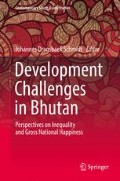Abstract
In the new millennium, the notion of Gross National Happiness (GNH), and the idea of promoting ‘happiness’ as a principle goal of development, has captured the international agenda and gained worldwide attention, recognition and influence. The notion is articulated as an alternative to the growth -oriented measurement of gross national product and as such emphasizes other and more spiritual values as opposed to the growth-oriented focus entailed in the neo-liberal development approach. Both approaches however share a strong commonality in their neglect of the idea of equal income distribution as a development goal. But perhaps even more concerning in the case of GNH is the added emphasis on traditional culture , which may well have the additional effect of promoting symbolic inequality between citizens: between state officials and bureaucrats as well as between women and men.
Access this chapter
Tax calculation will be finalised at checkout
Purchases are for personal use only
References
Amnesty (1998) Bhutan: crack-down on ‘anti-nationals’ in the East. Amnesty, London
Aris M (1994a) The raven crown: rise of monarchy in Bhutan. Serindia, London
Aris M (1994b) Introduction. In: Aris M, Hutt M (eds) Bhutan: aspects of culture and development. Kiscadale, Gartmore
BBS (2011) Happiness—is now the 9th millennium development goal. http://www.gnhc.gov.bt/2011/07/happiness-%E2%80%93-is-now-the-9th-millennium-development-goal/. Accessed Feb 2014
Bothe W (2011) Forming local citizens in Bhutan: the traditionalization of participation: empowerment, domination or subjugation? Copenhagen University, Department of Political Science
Bothe W (2012) The monarch’s gift. Critical notes on the constitutional process in Bhutan. EBHR: 40, pp 27–53
Bothe W, Sachdeva S (2013) Gendered participation in Sikkim and Bhutan: a comparative study on visions of female participation. East Antropol 66:2–3
Bourdieu P (1991) Language and symbolic power (ed and intro: Thompson JB). Polity Press, Cambridge
Cornwall A, Brock K (2005) What do buzzwords do for development policy? A critical look at ‘participation’, ‘empowerment’ and ‘poverty reduction’. Third World Q 26(7):1043–1060
Croserre B (1996) So close to heaven: the vanishing Buddhist kingdoms of the Himalayas. Vintage, New York
Dargey Y (2005) An introduction to values education. National Library, Thimphu
EU, Election Observation Mission (2008) Bhutan, final report. National Assembly Elections, 24 Mar 2008. Available at: ec.europa.eu/external_relations/…/election…/bhutan/final_report_en.pdf
Freire P (1960) Pedagogy of the oppressed. Continuum Books, New York
Friedman J (1992) Empowerment: the politics of alternative development. Blackwell, Cambridge
Hutt M (2003) Unbecoming citizens: culture, nationhood and the flight of refugees from Bhutan. Oxford University Press, Oxford
Joseph M (1999) Ethnic conflict in Bhutan. Nirala, New Delhi
Killick T (1995) Structural adjustment and poverty alleviation: an interpretative survey. Dev Chang 26(2):305–315
Kuensel (2009) By education not enforcement, 18 July 2009
Kuensel (2014) Will a quota for women bring about gender equality 8 Oct 2014
Lam D, Tenzing U (1999) Driglam Namzhag. A manual (Bhutanese etiquette). National Library, Thimphu
Meyers D (2004) Textiles in Bhutan II: cloth, gender and identity. In: Aris M, Hutt M (eds) Bhutan: aspects of culture and development. Kiscadale, Gartmore
Padmasambhava (2004) Dakini teachings: a collectin of Padmasambhava’s advice to the Dakini Yeshe. Rangjung Yeshe, Kathmandu
RGoB (1999) Bhutan 2020: ‘a vision for peace, prosperity and happiness’. RGoB, Thimphu
RGoB (2002a) 9th Five Year Plan 2002–2007. National Happiness Commission, Thimphu
RGoB (2002b) Vol 1. Main report. Ministry of economic affairs. http://www.moea.gov.bt/documents/files/pub5sg7255wr.pdf. Accessed Feb 2014
RGoB (2004) Bhutan poverty analysis report. Statistical Bureau, RGoB, Thimphu
RGoB (2007) Bhutan poverty analysis report. Statistical Bureau, Thimphu
RGoB (2008) Election act of the Kingdom of Bhutan. http://www.nationalcouncil.bt/wp-content/uploads/2011/02/Elec_Eng_08.pdf.
RGoB (2012) Bhutan poverty analysis report. Statistical Bureau, RGoB, Thimphu
Rizal D (2002) Administrative system in Bhutan: retrospect and prospect. Adroit, New Delhi
Rose L (1977) The politics of Bhutan. Oceana, New York
Scott J (1990) Domination and the arts of resistance: hidden transcripts. Yale University Press, London
Sinha A (2001) Himalayan Kingdom Bhutan: tradition, transition and transformation. Indus Publishing Company, New Delhi
Thinley JY (2010) Statement to the First High-Level Plenary Meeting of the United Nations General Assembly on the Millennium Development Goals, New York, 20 Sept 2010
United Nations (2000) United Nations millennium declaration. Resolution of the General Assembly 55/2. A/RES/55/2, 18 Sept 2000, 55th session, Agenda item 60 (b), para 2
United Nations (2012) Happiness: towards a holistic approach to development. http://www.un.org/esa/socdev/ageing/documents/NOTEONHAPPINESSFINALCLEAN.pdf; http://www.unric.org/en/happiness/27709-the-un-and-happiness. Accessed 9 Sept 2013
UNDP (2011) MDG report. Achievements and scaling up strategies. Institute for Management Studies, Thimphu
UNDP (2012) Poverty index. https://data.undp.org/dataset/Table-5-Multidimensional-Poverty-Index/7p2z-5b33. Accessed Feb 2014
World Bank (2000/2001) World development report. World Bank, Washington, DC
World Bank (2010) Country assistance strategy. Bhutan country management unit South Asia region
World Bank (2014a) Net ODA received per capita (current US$). http://data.worldbank.org/indicator/DT.ODA.ODAT.PC.ZS. Accessed Jan 2014
World Bank (2014b) Gini index. http://data.worldbank.org/indicator/SI.POV.GINI
Author information
Authors and Affiliations
Corresponding author
Editor information
Editors and Affiliations
Rights and permissions
Copyright information
© 2017 Springer International Publishing AG
About this chapter
Cite this chapter
Bothe, W. (2017). Gross National Happiness and Inequality. In: Schmidt, J. (eds) Development Challenges in Bhutan. Contemporary South Asian Studies. Springer, Cham. https://doi.org/10.1007/978-3-319-47925-5_4
Download citation
DOI: https://doi.org/10.1007/978-3-319-47925-5_4
Published:
Publisher Name: Springer, Cham
Print ISBN: 978-3-319-47924-8
Online ISBN: 978-3-319-47925-5
eBook Packages: Political Science and International StudiesPolitical Science and International Studies (R0)

